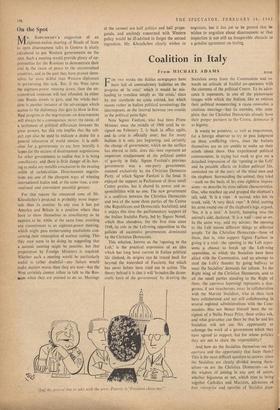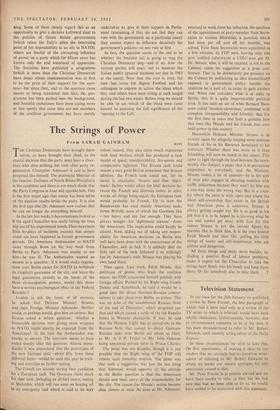Coalition in Italy
From MICHAEL ADAMS
ROME
FOR two weeks the Italian newspapers have been full of contradictory bulletins on the progress of 'la crisi,' which it would be mis- leading to translate simply as `the crisis,' since by our standards no crisis existed, but which means rather in Italian political terminology the interregnum, or the interval between two rounds in the political prize-fight.
Now Signor Fanfani, who had been Prime Minister since the middle of 1960 until he re- signed on February 2, is back in office again, and la crisi is officially over; but for many Italians it is only just beginning, and certainly the change of government, which on the surface has altered so little, does this time represent an important readjustment of the political centre of gravity in Italy. Signor Fanfani's previous government was a one-party government, manned exclusively by the Christian Democrat Party, of which Signor Fanfani is the head. It enjoyed the support in Parliament of three small Centre parties, but it shared its power and re- sponsibilities with no one. The new government is a coalition between the Christian Democrats and two of the same three parties of the Centre (the Republicans and Democratic Socialists); and it enjoys this time the parliamentary support of the Italian Socialist Party, led by Signor Nenni, which thus abandons. for the first time since 1948, its role in the Left-wing opposition to the policies of successive governments dominated by the Christian Democrats.
This solution, known as the 'opening to the Left,' is the practical expression of an idea which has long been current in Italian political life (indeed, its origins can be traced back far beyond the watershed of Fascism), but which has never before been tried out in action. The theory behind it is that it will 'broaden the demo- cratic basis of the government' by drawi.ig the 'And the general line to take with the press, Powers, is ( hose we."'
Socialists away from the Communists and to- wards an attitude of fruitful co-operation with the elements of the political Centre. To its advo- cates it represents, in one of the picturesque images with which the Italians like to enliven their political manoeuvring, a canto contutbio, a cautious marriage—but its enemies, who com- plain that the Christian Democrats already have their proper partners in the Centre, denounce it as bigamy.
It would be pointless, as well as impertinent, for a foreign observer to try to pass judgment on these conflicting views, since the Italians themselves are as yet unable to make up their minds about them. One experienced political commentator, in trying last week to give me a detached impression of the 'opening to the Left' and its possible effects on Italian political life, reminded me of the story of the blind men and the elephant. Surrounding the animal, they tried —each on the basis of his own sightless impres- sions—to describe its most salient characteristics. One, who reached up and grasped the elephant's tail, said, `It is a rope.' A second, who felt its trunk, said, `A' very thick rope.' A third. putting his arms round one of the elephant's legs, argued, 'No, it is a tree.' A fourth, bumping into the animal's side, declared, 'It is a wall'—and so on. In the same way, said my adviser, the opening to the Left means different things to different people. To the Christian Democrats—those of them, that is, who support Signor Fanfani in giving it a trial—the opening to the Left repre- sents a chance to break up the Left-wing opposition, in which the Socialists have been allied with the Communists, and an attempt to steal the Left's thunder by going halfway to meet the Socialists' demands for reform. To the Right wing of the Christian Democrats, and to all the small parties standing to the Right of them, the apertura (opening) represents a dan- gerous, if not treacherous, essay in collaboration with the Marxist Socialists, who in their turn have collaborated and are still collaborating in several regional administrations with the Com- munists. Has not Nenni himself been the re- cipient of a Stalin Peace Prize, these critics ask, and what guarantee can there be that he and his Socialists will not use this opportunity to sabotage the work of a government which they have agreed to support, but for whose policies they arc not to share the responsibility?
And how do the Socialists themselves see the apernera and the opportunity that faces them? This is the most difficult question to answer, since the Socialists are clearly divided among them- selves--as are the Christian Democrats—as to the wisdom of joining in any sort of union, whether bigamous or not, which tries to bring together Catholics and Marxists, advocates of free enterprise and apostles of Socialist plan- ning. Some of them clearly regard this as an opportunity to give a decisive Leftward slant to the policies of future Italian governments (which raises for Italy's allies the interesting point of her dependability as an ally in NATO); others are fearful of the corrupting influence of power on a party which for fifteen years has known only the arid wasteland of opposition. The Socialists have published a programme (which is more than the Christian Democrats have done) whose implementation was at first to be the price of their support for the aper- tura—but since then, and as the apertura came nearer to being translated into fact, the pro- gramme has been pushed into the bacicground, and Socialist spokesmen have been saying more or less openly that since they are not members of the coalition government but have merely undertaken to give it their support in Parlia- ment (abstaining if they -do not feel they can vote with the government on a particular issue), they cannot expect to influence decisively the government's policies—at any rate at first.
In fact, the question seems in the end to be whether the Socialist tail is going to wag the Christian Democrat dog—and if so, how the various parties will react, not to mention the Italian public (general elections are due in 1963 at the latest). Now that the crisi is over, the time has come for Signor Fanfani and his colleagues to express in action the ideas which they and others have been airing at such length during the last two weeks. Before long we should be able to see which of the blind men came nearest to assessing the full significance of the 'opening to the Left.'


































 Previous page
Previous page